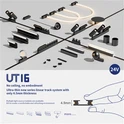Choosing the right light fixtures can add comfort and beauty to our space. Here are seven key factors you need to consider when choosing a light fixture:
1. Space size
The first thing you need to consider is the size of the space. Large spaces require brighter fixtures, while smaller spaces require lower-bright, better-ambience fixtures. For example, for a lobby or open space, you may want to choose a larger chandelier or ceiling lamp to provide plenty of light. And for the bedroom or reading area, a soft bedside lamp or table lamp may be a better choice,such as our suspended led linear pendant light.
2. Light requirements
Different rooms and activities require different types of light sources. For example, a workspace that needs to stay focused may require bright direct light, while a relaxation area may require soft indirect lighting to create a cozy atmosphere. The reading area needs plenty of light to protect the eyes. Consider using dimmers or luminaires that can switch between different light sources to meet these needs.
3. Lighting style
The style of the fixtures should match the room décor and the overall home style. Modern style lamps tend to be simpler and go well with modern furniture and décor. Traditional lamps, on the other hand, may have more decoration and details, which are more suitable for matching with classical furniture and decorations. Consider the overall style of your home and choose a fixture that matches it.
4. Energy efficiency rating
With the increasing awareness of environmental protection, it has become a trend to choose energy-efficient lamps and lanterns,such as our solar step lights step light. When shopping for a luminaire, pay attention to its energy efficiency rating and the type of bulb. LED lamps are generally more energy-efficient and last longer than traditional incandescent lamps. Choose the right bulb type, such as E27, E14 or GU10, etc., to match your fixture.
5. Luminaire quality
Quality is an important factor to consider when choosing a luminaire. Quality light fixtures are often manufactured using more durable materials, such as metal or glass, rather than plastic. They may also have better energy efficiency ratings, longer service life, and fewer maintenance needs. At the time of purchase, look at product reviews and feedback to ensure that you are buying a high-quality fixture.
6. Installation
When buying a light fixture, consider whether it will be installed in a way that suits your room and ceiling. Some fixtures may require special mounting hardware, such as hangers or ceiling absorbers. If you're planning to hang the light fixture on the wall or ceiling, make sure you understand the installation steps required and the tools needed. It is best to choose a light fixture that is easy to install to reduce the hassle of the installation process.
7. Budget Scope
Last but not least is the budget. Different lights come in different price ranges, so make a choice based on your needs and budget. If you're on a budget, you can consider buying some cost-effective fixtures or upgrading them gradually if needed. If you have a bigger budget, you can opt for some more luxurious and premium fixtures to elevate the décor level of your home. Remember, lighting is a long-term investment, so choose one that fits your needs and budget.
In general, choosing the right luminaire needs to consider the size of the space, the need for light, the style, the energy efficiency class, the quality, and the installation method。







